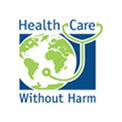Trespass against us
Reflecting on the 35th anniversary of the Bhopal disaster
By Gary Cohen, founder and president of Health Care Without Harm
On that terrible night 35 years ago, Sunil Verma slept soundly beside his brothers and sister. He awoke suddenly after midnight to choking and screaming around him. At first, he thought someone must be cooking with chilies, but soon there was the sound of screaming in the lane beside his house. Hundreds of people were frantically running out of their houses and down the street.
Someone yelled that the Union Carbide chemical factory had exploded. A poisonous cloud of toxic smoke blanketed the entire city, blinding people and choking them to death. Within 72 hours, 8–10,000 were dead and tens of thousands injured, including Sunil’s parents and five of his siblings. This event — the Bhopal disaster — has since been called the “Hiroshima of the chemical industry.”
For millions of people around the world, the Bhopal disaster was a wakeup call to the dangers of the petrochemical industry. In the United States, it mobilized a grassroots citizen movement to demand the right to know about the chemical threats in their communities and led to the world’s first national Right to Know law. In the board room of the American Chemistry Council, it led to the creation of a Responsible Care Program to convince people that the industry had safety foremost in its business practices. In India, it led to a 35-year struggle to gain health compensation and justice for the thousands of people harmed and killed by this disaster. Verma, himself a victim, was a lifelong advocate for those affected by the tragedy.
Bhopal was the flashpoint for my initial involvement in the environmental justice movement.
Personally, Bhopal was the flashpoint for my initial involvement in the environmental justice movement. Like so many people, I was horrified by the photos of hundreds of blinded people and stacks of corpses. These images reminded me of photos of the Holocaust, which were imprinted into my brain growing up as a Jewish boy in New Jersey. “Don’t ever let it happen again” was the searing message I received growing up. Never let people be objectified and made expendable because then anything is possible.
As the story unfolded, I found that the workers had been warning the company for months that a potential runaway explosion could occur. Meanwhile, the company was not making money selling its pesticides so it cut back on safety training, it turned off its warning system to save money, and it ignored the workers. Once the disaster happened, rather than accept responsibility for its negligence, the company invented a worker-sabotage theory and used it to defend itself in the courts. When a friendly Indian administration cut a deal for $470 million as a final settlement for the disaster, one of the PR people for Carbide quipped, “$500 is plenty good for an Indian.”
Meanwhile, the factory was never cleaned up. Toxic chemicals continued to leak into the neighboring community, poisoning another generation of Bhopalis.
Meanwhile, the factory was never cleaned up. Toxic chemicals continued to leak into the neighboring community, poisoning another generation of Bhopalis.
When the Indian courts charged Union Carbide with criminal negligence, they decided to ignore the courts. After Dow Chemical bought Union Carbide years later, they claimed they had no responsibility for the Bhopal chemical contamination. The Indian courts considered them culpable and to this day Dow remains a fugitive from justice. Thirty-five years later, thousands more have died from their toxic exposure while the abandoned factory lies like a rotting industrial carcass, seeping poisons into the surrounding groundwater.
We have learned so much about the culture of the chemical industry since the December 1984 Bhopal disaster. We have learned, for example, that we all carry the waste products of this industry in our bodies. Our children have all been branded with Dow’s pesticides, DuPont’s Teflon chemicals, Exxon’s plasticizers, and Albemarle’s flame-retardants. We have learned that toxic chemicals have invaded every corner of the globe so that people living in the Arctic have the same toxins in their bodies as people in Alabama and India. We have seen how the chemical companies cannot be relied upon to give us honest information about the health impacts of their chemicals, even as cancer rates in the United States have risen to one in three women and one in two men, even as children are being born today with almost 100 toxic chemicals in their bodies.
What is so miraculous about the people in Bhopal is that they have never given up their fight for health and justice. They have continued to sound the alarm about the chemical industry’s lack of accountability and their continued trespass against us.
What is so miraculous about the people in Bhopal is that they have never given up their fight for health and justice. They have continued to sound the alarm about the chemical industry’s lack of accountability and their continued trespass against us.
If we care about the health of our children and our communities, it is time we rein in an industry that has invaded every corner of our Earth. It is no longer only the people in Bhopal who face ongoing toxic threats to their health but all of us. When are we going to champion the rights of our children to be born and grow up toxic-free over the rights of the chemical industry to profit at the expense of our health?
Gary Cohen has been a pioneer in the environmental health movement for more than 30 years, founding Health Care Without Harm, Practice Greenhealth, and Greenhealth Exchange. He serves on several boards, including Health Leads and Coming Clean. A MacArthur Fellow, Cohen has been recognized by the White House, the U.S. Environmental Protection Agency, the Skoll Foundation, the Huffington Post, and many more for his efforts to transform the health sector to become environmentally sustainable.
